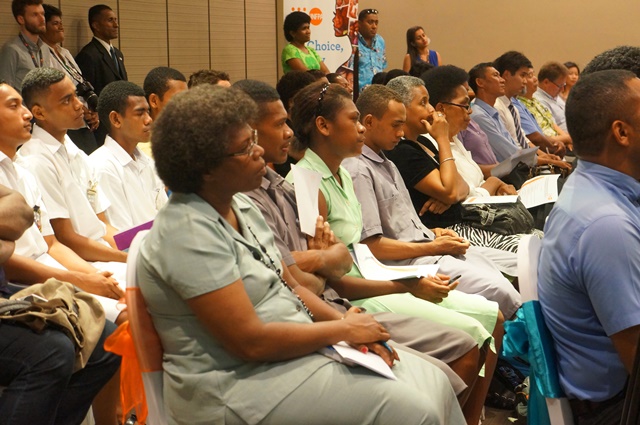From being the first woman to graduate as a dentist from the Fiji School of Medicine in 1967 to being the first woman Speaker of Fiji's House of Representatives in 2014, Dr Jiko Luveni remains modest in her attribution to local communities as her most invaluable and critical learning spaces.
"It is so crucial that people who want to serve the nation, must serve people first and foremost, they must understand the psyche of the people that comprise their citizenry," Dr Jiko said in her office yesterday, the day after the official announcement of her as the UNFPA (United Nations Population Fund) Pacific High-Level Champion.
"The UNFPA mandate area of population is or should be at the centre of all development programs, whatever it is, it is for the people. It has to be understood in the perspective of people's age group, geographical location, their financial situation, gender - all these has an impact on the needs of a population.
"This is the only way that we can then accurately and realistically address the needs of people or how exactly to make a difference in their own lives. You make a difference in people's lives, you are making a difference at national level and this is why in whatever I do, it is always with population considerations."
In a candid interview, Dr Luveni described how in her younger days, accessibility to contraceptives to unmarried individuals was unheard of, and nurses followed a strict policy of issuing contraceptives only to married couples.
Dr Luveni spent 15 years (from 1988) at the UNFPA Pacific staff member where her medical training which by now had included a University of Sydney Public Health Dentistry qualification (1982) was complemented by a better understanding of the dynamics of population and development.
Dr Luveni discussed the importance of recognizing the inextricable link between decisions as private as the number of children one wanted and the spacing between them, and the national capacity to ably provide for its populace.
"We must continue our efforts towards the empowerment of women; they have a lot of influence on their children and husbands as well, they run households so that the livelihood and quality of lives of each family member is really up to them," she said.
"And now in Parliament as the first woman Speaker of the House, I represent women and I must perform to the best of my ability so that other leaders including men are convinced that we are as capable in leadership roles.
"There has been and continues to be a global and national effort to improve the status of women and I believe in Fiji, the women, we are doing our part and getting there and we are slowly improving our status to achieve our target according to Beijing where 30 per cent of women must be in leadership roles including Parliament."
During the International Conference on Population and Development in Cairo in 1994, some 180 world leaders endorsed a 20-year programme of action; the conference defined sexual and reproductive health and rights as: a state of complete physical, mental and social well-being and not merely the absence of disease and infirmity, in all matters relating to the reproductive system, its functions and processes. Reproductive health therefore implies that people are able to have a safe and satisfying sex life, that couple have the capacity to reproduce and the freedom to decide if, when and how often to do so. Governments are encouraged to ensure that policies and services are conducive for people to be able to enjoy reproductive rights; specifically, comprehensive and correct information and a full range of health-care services, including family planning, which are accessible, affordable, acceptable and convenient to all users.
Discussions of achieving gender equality indicators like reaching the 30 per cent participation threshold or empowering young women to make choices for themselves are all related to sexual and reproductive health; if girls and young woman do not have autonomy over their own bodies then decision-making processes for other aspects of their lives are already curtailed.
"To champion or advocate for a particular issue, one would have to sincerely believe in the cause. To champion an issue is to believe in the potential change for the better," Dr Laurent Zessler, the UNFPA Pacific Director and Representative said during the official announcement of Dr Jiko's new role as the UNFA Pacific High-Level Champion.
"It is to our advantage that she had not lost her personal interest and commitment to the various mandate areas of the UNFPA - from reproductive health issues to those surrounding violence against women."


